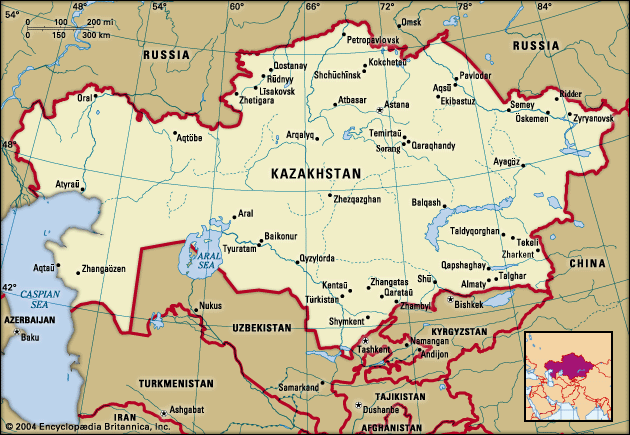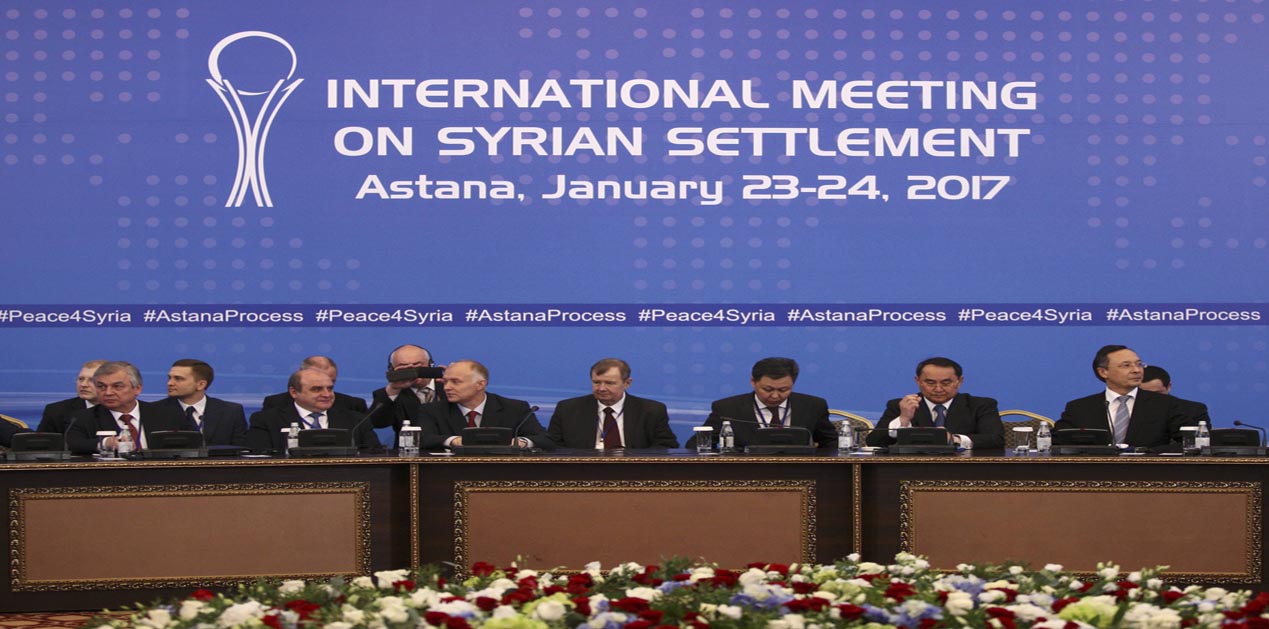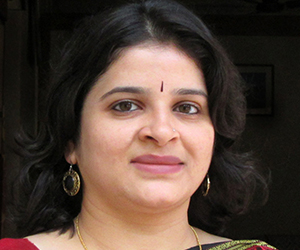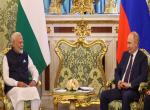Kazakhstan has assumed non-permanent membership of the United Nations Security Council (UNSC) for the tenure of 2017-18. It is the first Central Asian Republic (CAR) to join this supreme body. Kazakhstan is a young nation that gained independence in 1991 as a result of the Soviet Union disintegration. In the last 25 years, it has emerged on the world stage with its dynamic economy, peaceful society and robust foreign policy. It maintains sound bilateral relations with its neighbors and many other global powers. In recent years, it has played constructive role in the field of conflict resolution; latest example is the Astana Talks on Syria. The emergence of Kazakhstan as an important player on the world stage is worth studying.
Geo-Political Significance of Kazakhstan
Location and the geography attach to Kazakhstan immense geo-strategic importance. It is a ‘trans-continental’ country1, as10% of its territory falls in Europe and the rest 90% in Asia. With the area of about 2.9 million sq kms, Kazakhstan is the 9th largest country in the world. It is also the largest landlocked country in the world. Area-wise Kazakhstan is the largest within the five CARs. It borders Russia in the north, China in the east, and Kyrgyzstan, Uzbekistan and Turkmenistan in the south.

Kazakhstan shares approximately 7.5 thousand km long border with Russia. This is the second longest border shared between any two countries in the world2. Kazakhstan is the only CAR that borders Russia; therefore, can be considered as Russia’s gateway to Central Asia. Moreover, Kazakhstan is one of the three CARs which border China, other two being Kyrgyzstan and Tajikistan. The landlocked country Kazakhstan, has two strategically important water bodies on its borders. On its western border lies the Caspian Sea. Although the legal division of the Caspian Sea between its five littoral states is not clear, it is generally understood that the Northeastern part of the Caspian Sea belongs to Kazakhstan3. Caspian Sea and its surrounding has abundant hydrocarbon reserves. On the southern border of Kazakhstan lies the Aral Sea, which is divided between Uzbekistan and Kazakhstan. In recent years, shrinking of the Aral Sea and environmental degradation has raised serious concerns.
Kazakhstan is endowed with abundant natural resources, especially crude oil and Uranium, which are vital in the field of energy security. Kazakhstan holds 11th position in the world in proven oil reserves. This rank is likely to go up because of increasing exploratory activities. Because of low consumption, Kazakhstan exports almost 85% of its oil4. Top destinations of the Kazakhstan’s oil are Russia, European Union (EU) and China. Kazakhstan has world’s second largest Uranium reserves, and is world’s largest producer of Uranium since 2009. It accounted for 39% of world’s uranium production in 20155. In addition to this, Kazakhstan has rich reserves of iron-ore, coal, gold, silver, copper, lead, zinc, tungsten and barite. The country is ranked first in the world in explored reserves of zinc, tungsten and barite.
Kazakhstan has the largest economy in Central Asia which has undergone a deep transformations since independence. The per capita Gross Domestic Product (GDP) has increased almost twenty times in the last 25 years. According to the World Bank classification, the country has joined the group of countries with above-average income6. It has set the goal of becoming one of the 30 most developed countries in the world by 2050. However, Kazakh economy is heavily dependent on natural resources, thus, there is a need for diversification. Falling prices of oil have inversely affected the growth rates in recent years.
As discussed earlier, Kazakhstan occupies a strategic location and has the potential to act as a transit link in the trans-national, trans-regional and trans-continental connectivity. Kazakhstan, along with other countries of the region, is building a complex web of transport corridors and energy pipelines along the Eurasian region. It is trying to convert the perceived disadvantage of being landlocked into an asset by constructing networks of roads and railways, crisscrossing from East to West and North to South. Kazakhstan is implementing a large-scale project titled “New Silk Road” that envisions revival of country’s historical role as the bridge between Asia and Europe.
Kazakhstan’s Relations with the Major Powers
President Nursultan Nazrbayev, ruled Kazakhstan before the country gained independence. He has been the major driver of the country’s foreign policy. In the immediate aftermath of independence, Kazakhstan was going through painful economic transformation. Therefore, President Nazarbayev gave primacy to country’s domestic developments, economic progress and social stability, which was also reflected in his external engagements. On the basis of ‘Multi-Vector’ foreign policy, Kazakhstan nurtured close ties with Russia, China, United States (US), European Union (EU) countries and the Islamic world. At the same time, it has avoided over-dependence on any one power, and has tried to diversify its relations.
Russia has always been a paramount diplomatic and security partner of Kazakhstan. Apart from the fact that Russia is an erstwhile political master; there is presence of significant Russian diaspora in Kazakhstan, and Russian language still dominates the public discourse. Being a landlocked country, Kazakhstan is dependent on Russia for most of its trade and transit. In the initial years of independence, it was dependent on Russia for technological support. Russia has traditionally been Kazakhstan’s largest trading partner; however, there is an imbalance in this trade7. The economic cooperation between the two countries is very high, which takes place bilaterally as well as through the framework of Eurasian Economic Union (EEU).
Relationship between Kazakhstan and China has significantly improved in recent years, the culmination of which was the signing of the ‘Comprehensive Strategic Partnership’ in 2015. The two countries can be seen cooperating in fields like trade, investments, oil extraction, science and technology, and cultural and humanitarian spheres. Chinese President Xi Jinping announced the Silk Road Economic Belt Policy, during his visit to Astana in 2013, in presence of Kazakh President Nazarbayev. Kazakhstan occupies vital position in the One Belt One Road (OBOR) project, as most routes from China to Europe pass through its territory. Kazakhstan is welcoming the Chinese investments, as they are contributing in steady improvement in infrastructure and cross-border connectivity. However, increasing economic footprints of China are also causing a degree of uneasiness amongst local population8.
Kazakhstan is sandwiched between Russia and China, and it is important for them to balance between the two super powers. Emergence of China has played vital role in reducing Russian influence. Construction of a pipeline carrying crude oil from Caspian shore of Kazakhstan to the Xinjiang province of China was a landmark development, as it was the first pipeline constructed from a CAR to any country other than Russia. Later, Central Asia-China gas pipeline was also built from Turkmenistan to China. This pipeline passes through Kazakhstan, and carries a portion of Kazakh gas to China. Abundance of natural resources has given Kazakhstan sufficient bargaining power.
Kazakhstan’s close ties with the US and the EU countries are based on economic diplomacy. EU is Kazakhstan’s major trading partner, and is the top destination of its exports, which mainly comprise of crude oil9. EU accounted for almost 50% of the Foreign Direct Investment (FDI) in Kazakhstan in 2014. In the country-wise analysis, US becomes the biggest investor in Kazakhstan10, followed by Netherlands, UK and France. Relationship between Kazakhstan and the West has a political connotation, as the later has been pushing for democratization, rule of law, legal reforms and human rights. Moreover, Kazakhstan’s accession to North Atlantic Treaty Organization’s (NATO) ‘Partnership for Peace’ program, its support to International War against Terror, and its efforts in the field of Nuclear Disarmament have significantly improved these relationships.
Since independence, Kazakhstan has developed close contacts with the Islamic world. Such close interaction was obvious and natural, as about 60% of Kazakhstan’s population practice Islam. It has maintained equidistant relationship with major Muslim states, including Turkey, Iran, Saudi Arabia and Pakistan. However, Kazakhstan-Turkey relations are determined less by Islam, and more by their common Turkish heritage. Kazakhstan’s robust relations with Iran was reflected through Rouhani’s visit to Astana in December 2016, during which the two signed a number of agreements on economic and trade cooperation. Kazakhstan had played a constructive role in resolution of Iran’s nuclear issue. Kazakhstan’s economic interaction with the Islamic world has increased in recent past, with enhanced trade and regional connectivity. Development of the Kazakhstan-Turkmenistan- Iran railway line has been a stepping stone in this regard. Nevertheless, Kazakhstan’s close relations with the Muslim states have not affected its relationship with Israel, with whom it enjoys high-level of oil trade and defense relations.
Kazakhstan’s Role in Multi-Lateral Forums

Since 1991, Kazakhstan has been an active participant in various international and regional organizations. In the immediate aftermath of independence, it became member of the United Nations, where it has played constructive role in the fields of security and disarmament. Kazakhstan’s adoption of nuclear-weapon free status, abandonment of its nuclear arsenal (which was fourth largest in the world in 1992), and closure of the nuclear test site of Semipalatinsk was appreciated by the world. It was one of the drivers behind adoption of the Comprehensive Test Ban Treaty (CTBT) in 1996, and Central Asia Nuclear Weapon Free Zone Treaty that came into force in 200911. President Nazarbayev has actively campaigned for Nuclear Disarmament in all his external engagements.
Kazakhstan, being a trans-continental country, has been involved in regional organizations of Asia as well as Europe. It became member of the Organization for Security Cooperation in Europe (OSCE). In fact, it was the first former Soviet State, and first predominantly Muslim state, to achieve OSCE chairmanship in 2010. In the following year, it also became the chairman of the Organization of Islamic Conference (OIC). Under the auspices of the UN, Kazakhstan initiated Conference on Interaction and Confidence-Building Measures in Asia (CICA), which brings together as many as 26 Asian states for expansion of dialogue and trust. Astana also hosts regular sessions of the Congress of the Leaders of World and Traditional Religions. Thus, Kazakhstan has played an active role in promoting the ‘inter-civilisational’ and ‘inter-faith’ dialogue, and also the ‘East-West’ communication.
At the multi-lateral level, Kazakhstan has maintained fair relationship with its former political master Russia. After becoming independent, it became part of the Commonwealth of Independent States (CIS) and Collective Security Treaty Organization (CSTO) which deals with regional security challenges. In 1990s, President Nazarbayev had also triggered the process of economic integration between the Eurasian powers; which led to creation of the Customs Union in 1995, Eurasian Economic Community (EurAsEC) in 2000, and finally Eurasian Economic Union (EEU) in 2014. EEU member-states include Kazakhstan, Russia, Armenia, Belarus and Kyrgyzstan. The EEU has created a single Eurasian market, and encourages free movement of goods, capital, services and the people. EEU member countries enjoy high degree of cooperation in terms of trade, transit, transport and investments. Membership of EEU has boosted Kazakhstan’s economic development.
Kazakhstan was one of the initiators in the process called as ‘Shanghai Five’, which came into being in 1996 with the prime purpose of reducing border tensions in Central Asia. In 2001, it was transformed into Shanghai Cooperation Organization (SCO), which comprised of Russia, China and four CARs, barring Turkmenistan. The SCO member states have pledged cooperation against ‘three evils’ of terrorism, extremism and separatism. SCO has been actively pursuing regional security and economic integration in the Eurasian region.SCO Summit of 2017 is going to be held in Astana under the presidency of Kazakhstan. This summit will mark the first expansion of the organization since its conception. After India and Pakistan’s accession, SCO is likely to play a larger role in Eurasia.
Significance of Kazakhstan in Contemporary International Scenario
Kazakhstan has joined the UNSC for the tenure of 2017-18 as a non-permanent member. In the election at the UN General Assembly on 28 June 2016, Kazakhstan received 138 votes and won from the group of Asia-Pacific states. As already mentioned, it is the first CAR to become member of the high-level institution. Kazakhstan’s membership in the UNSC is likely to attract the attention of the Council to developmental challenges and security issues in Central Asia. For UNSC, Kazakhstan has set its priority areas as energy, water and food security, nuclear non-proliferation, peaceful settlement of conflicts, and combating terrorism and extremism. Even though a symbolic post with limited powers, this will give fillip to Kazakhstan’s external engagements.
Under President Nazarbayev’s leadership, Kazakhstan has played a key role in peacefully resolving various international conflicts. It acted as the mediator to bring down the tensions that existed between Russia and Ukraine, following the crisis in Crimea and Ukraine. Kazakhstan also took active part in resolving Iran’s nuclear crisis. Recently, it was successful in bringing Russia and Turkey, two estranged partners, on table for negotiations. Since January 2017, Kazakh capital Astana has hosted several rounds of ‘International Meeting on Syrian Settlement’. The first round in the series of meetings took place on 22-23 January, which was a breakthrough as delegates from the Syrian government as well as the Opposition took part, along with representatives from Russia, Iran, Turkey and the UN. Kazakhstan only offered a ‘neutral venue’ for these talks, and did not actually participate in the talks. It was selected as the host country by initiators of the talks, namely Russia, Turkey and Iran; as it maintains ‘trust-based’ relations with all the three. After successful conducting of the talks, Kazakhstan is now promoting Astana as a neutral platform to resolve other international conflicts.
The year 2017, is going to be a vital year for Kazakhstan's external affairs. It has already started functioning as the UNSC member, and three rounds of Astana talks on Syria has concluded. In the month of June this year, Astana is hosting SCO Summit, which will result in first expansion of the organization. Moreover, Kazakhstan is holding the world exhibition ‘Expo 2017’ at Astana from June to September. More than hundred countries and number of international organizations are expected to participate in the Expo. The theme selected for the exhibition is ‘future energy’. Kazakhstan has become the first post-Soviet country to host such grand event, which will underline Kazakhstan’s emergence as a global power.
Conclusion
Under the dynamic leadership of President Nazarbayev, Kazakhstan has achieved remarkable economic prosperity, political development and social stability. With qualitative contribution at various multi-lateral platforms, the country has risen as an important player on the world stage. The role it has played in the fields of peace-building, conflict resolution and nuclear disarmament is appreciated by most international actors.
Endnotes
1. Countries located on more than one continents are called ‘trans-continental’ countries. Since there is no clear physical distinction between Asia and Europe, the list of trans-continental countries in this part of the world is long. It includes countries like Turkey, Russia, Kazakhstan, Azerbaijan, Georgia and Armenia.
2. The border between US and Canada is the longest border shared between any two countries in the world.
3. Caspian Sea is world’s largest landlocked water body. It is surrounded by five states, namely Russia, Kazakhstan, Turkmenistan, Iran and Azerbaijan. It is also a trans-continental water body, as is divided between Asia and Europe. The Caspian Sea has characteristics of both sea and the lake. Therefore legal status of the Caspian Sea, whether as a lake or sea, is not clear, and so also the demarcation of water boundaries among the five littoral states. The Caspian Sea and its surrounding region is rich in hydro-carbons.
4. http://www.sumatec.com/operation-kazakhstan-oilgas.php
5. http://www.world-nuclear.org/information-library/country-profiles/countries-g-n/kazakhstan.aspx
6. http://www.akorda.kz/en/republic_of_kazakhstan/kazakhstan
7. http://mfa.gov.kz/index.php/en/foreign-policy/kazakhstan-s-relations/kazakhstan-cis-cooperation/16-materials-english/6347-kazakhstan-russian-relations
8. Economic Intelligence Unit, Country Report on Kazakhstan, December 2016.
9. https://eeas.europa.eu/headquarters/headquarters-homepage_en/4076/EU-Kazakhstan%20relations
10. http://www.kazakhembus.com/content/kazakh-us-relations-overview
11. http://kazakhstanun.com/twenty-five-years-at-the-united-nations-my-journey/
Image Source: http://admin.aswatmasriya.com











Post new comment